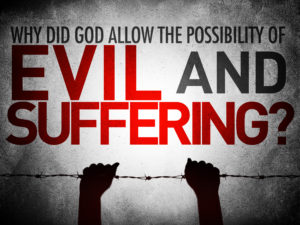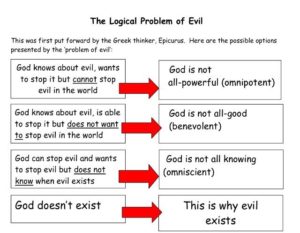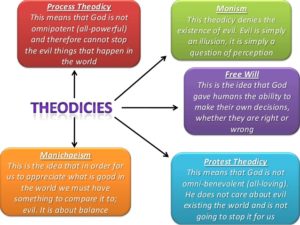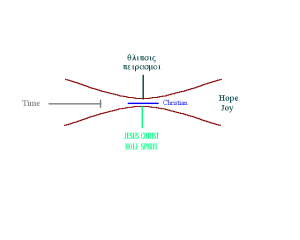
This question plagues the lost and often
Confounds the saved; yet, God has an answer
Why is there evil in the World? How one answers this question is determined by one’s method of reading and understanding the Bible, hermeneutics; one’s prevailing worldview; and one’s position relative to God and His salvation. James tells us one obvious reason people suffer: they covet what others have and seek to obtain by force that which was not theirs (Ja 4:1-4). This places the blame squarely on each individual; however, theodicy seeks to explain evil by blaming God. Thus, sinful man ducks responsibility making God responsible for evil and thus morally incapable of righteously judging sin since He is the author of evil and must first judge Himself.

The title implies impartiality when bias
Always exists in man due to sin
The only two people who had an opportunity to make a free will choice were Man and Woman in the Garden before they had sinned; yet, even they were not free from bias and therefore incapable of making an unbiased decision to sin or not to sin (Ge 3:1-17). They were made in the flesh and though it lay dormant the flesh has its own criteria guiding its decision making process (1Jo 2:16). James has already informed us that the underlying basis for sin is covetousness and John describes the process whereby the flesh decides what to covet and how to justify the coveting: lust of the flesh, lust of the eyes and the pride of life. When Satan challenged woman, he enticed her with the goal of being as god {covetousness}; however, she chose to sin because the tree was good for food {lust of the flesh}, delight to the eyes {lust of the eyes} and desired to make one wise {pride of life}. What did Woman not do to avoid sin? She did not appeal to her authority; i.e., Man. Instead, she enticed Man who also chose to sin though his process is not described. Both ate of the Tree of Knowledge believing God was withholding knowledge from them. They wanted to know evil and when they sinned they discovered that they were the evil. God has no evil, does not use evil to test anyone and cannot be tempted by evil (Ja 1:13-17). God is immutable so this never changes. The easiest way to explain evil is to explain away God’s existence, as in the above graphic; however, this only illustrates the problem of man’s ungodliness.
Paul explains why God’s wrath is justified against man’s ungodliness; but, this is lost when translated from the Greek. The English word ungodliness seeks to convey the meaning of the Greek word, ἀσέβεια; asebeia. This word means that the sinful mind since conception rejects God and God’s truth in all forms (Ps 51:5). Since man is made in the image of God and needs order he seeks to explain his self-imposed order based on the his interpretation of the elements of creation (Ro 1:21-22). Therefore, all thoughts, words and deeds of sinful man are devoid of God’s truth and thus are unrighteous, ἀδικία; adikia. All people born since Man and Woman sinned are guilty of rejecting God’s self-evident truths: Creation {external} and morality {internal} meaning that they cannot unbiasedly understand evil’s causation but seek to blame God. This is a problem since in the flesh nothing good dwells; thus, no flesh shall boast before God (Ro 7:18; 1Co 1:29).

Theodicies come in many flavors
Commonality: God is flawed
Though there are various forms of theodicy philosophy, they all ask the same question, “Why does God allow evil?” Instead, the proper question must be, “Why did not Woman or Man call upon God before rebelling?” Or, “Why did God not simply end everything once Woman and Man had sinned?” The former question is answered in the negative because of the pride of life of the flesh; the flesh did not need God, does not need God today and will never need God even when residing in the Lake of Fire for eternity. Sinful man never seeks after God, never attempts to understand from God’s perspective, never does good for there is no fear of God’s judgment in man. All were born in sin and remain in sin until God saves us (Jo 6:44). The answer to the latter question is, “Love of God (Jo 3:16; 1Co 13:13).” God has no pleasure in the death of the sinner; this is one reason why He allows the sinners to go their way in this life; postponing judgment so one may be saved (Ez 33:11; Ro 1:24-25). God does not FORCE the lost to believe in this life. Yet, theodicy faults God for allowing evil; i.e., for not forcing people to believe in and accept Him against their wills! Thus, they set up a false dilemma fallacy to blame God for allowing evil and not saving everyone from evil.
God allows mankind to live according to his philosophies which only result in divisions, degradation, violence and death: continued separation from God. However, God does save some based solely on His own criteria (Ro 9:14-24; Ep 1:3-10). These saved people by their very existence testify to the love and goodness of God and expose the evilness of sinners; i.e., it exposes the lie of theodicy, that God is evil. So, why does evil exist? Because God has allowed sinners to exist in order to save all whom He has called and demonstrate His love and mercy so that all may be without excuse at the judgment (Ro 2:1-5). The world faces the evil it chooses to live with; natural result of embracing sin. However, evil is also used of God for His people.

This is the process for Saved People
Refining Us into the Image of Christ
The sanctification or hagiazo process is used of God to bring them to completion in the image of Christ. This process was first described in Job, chapters one and two, to turn a self-righteous lost man into a saved person totally dependent on God for righteousness. God allows Satan to grind His people down, within limits, to make each person aware of personal sin at work in one’s life (Lk 22:31-34; 1Co 10:13). The above graphic depicts this process. Tribulation and testing pushes down against the immovable standards of God, Christ and the Spirit to mature us into the image of Christ (Ga 2:20). This is the process reserved for the saved, not the lost, as God removes our worldview so that we may see clearly His hand at work (2Ki 6:11-17).
God does not punish the lost with evil for their sin in this life; He has given them up. They are enjoying the fleeting pleasures of their sinful choices (He 11:25). Because they have rejected God and substituted their scientisms for science they live with the unintended consequences of a chaotic and illogical worldview that is woefully inadequate. They have been blinded by Satan who is their father to reject the love of God; therefore, to follow Satan is to walk in hate (Jo 8:44; 2Co 4:3-4).
God is changing the saved to live in the new world to come in a new body in an intimate relationship with Christ for eternity; this is the narrow gate (Mt 7:13-14). The lost reject this path because it is hard and those who start on it are soon turning back to the easy path because they rely on their flesh which quits (He 10:36-39). Only reliance on Christ allows one to walk this path in Him (Ps 23:4). Yet, even on this path it is the discipline of Christ that comforts us for if He did not discipline us, we would not be of His flock (Jo 10:1-5, 16; He 12:7-8). Why is there suffering? So we may be made in His image; thus, we rejoice in our sufferings if indeed we be saved (Ro 5:3; 1Pe 4:13).
